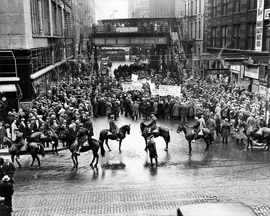Miami Herald, The (FL) – April 23, 1995
Author: JACK WHEAT Herald Staff Writer
History has ignored Charles Dawes, vice president of the United States under President Calvin Coolidge.
Sometimes, obscurity is a kindness.
Dawes was not merely Silent Cal’s second banana. In 1925, he won the Nobel Peace Prize for helping devise a plan
to ease the burden of the reparations Germany had to pay after World War I. The reparations are widely credited
with leading to World War II, creating such hardships that the German people turned to Hitler.
The banker-politician moved on to more dubious achievements. As vice president, he figured in the collapse of the
Great Florida Land Boom and the Florida banking crash.
Most who jumped into the boom lost. A lot lost big.
But Dawes made out like a bandit, historian Raymond Vickers of Tallahassee has discovered. His new book, Panic
in Paradise, published by the University of Alabama Press, shows Dawes did it by being a bandit.
“All of America’s gold rushes, all her oil booms and all her free-land stampedes dwindled by comparison” with the
manic Florida land boom of 1925, according to writer Mark Sullivan’s account in the 1930s.
“Florida’s boom was the greatest speculative frenzy in history,” Vickers wrote. “Not since the days of the
carpetbaggers had so many opportunists and swindlers migrated south.”
The boom spawned extravagant, exotic developments like Coral Gables. The bust stymied the state’s growth for
decades, leaving the joke about “buying a little swamp land in Florida” as a permanent metaphor for fraud and
gullibility.
Economists have long been fascinated by the boom and bust. The Roaring Twenties became a monster in Florida
three years before they turned on the whole nation. In hindsight, the Florida panic set off a sort of Great Depression
in miniature, fueled by the same cycle of wild speculation on credit.
Vickers, though, is the first scholar to get at state and federal regulators’ reports on the 150 Florida and Georgia
banks that failed in 1926, tumbling like dominoes once the Florida boom burst. Congress and all 50 state
governments have made bank regulator records secret. Sixty-three years after the crash, Vickers, a lawyer and
former state bank regulator, sued to study the records for his doctoral dissertation at Florida State University.
The conventional cause-and-effect explanation — that the sudden collapse of the land boom triggered the bank
crash, leaving banks stuck with worthless land — has it backward, Vickers said.
The boom of booms couldn’t have happened without massive banking fraud and manipulation of banks, Vickers
concluded. Vice President Dawes was the highest ranking of hundreds of bankers, politicians, developers,
promoters, newspapermen and regulators that formed great speculating machines around the state.
Fraud was the No. 1 industry in Florida, Vickers reports. Nearly everyone but the soon-to-be-poor suckers who
trusted the banks with their money seemed to be involved.
Years before the boom, looting of banks yielded seed money for land acquisition, construction, promotion and graft,
he found.
Dawes tapped into the most audacious, fantastical Florida land scheme of them all — New York society architect
Addison Mizner’s 16,000-acre resort development at Boca Raton.
It was to have been a combination of Rio de Janeiro in Brazil and Venice in Italy. The Cloisters hotel, a mere trinket
in Mizner’s great scheme, was the only grandeur that actually came to be.
Dawes first entered the scheme early in a cameo role, as an affiliate of Palm Beach National Bank, which helped
finance Mizner’s folly, Vickers said. Dawes’ brother, U.S. Comptroller of the Currency Henry Dawes, chartered the
bank in 1924.
By 1926, Mizner’s big Boca Raton development company had completely annexed Palm Beach National Bank.
When the Boca project went belly up, so did the bank. The vice president and his cronies stepped into the ruins,
preventing Mizner company assets from going to Palm Beach National Bank’s defrauded depositors, Vickers
discovered. Dawes and his brothers wound up with the assets, which included some of Florida’s most valuable real
estate.
The long-ago machinations are not simply ancient history, Vickers said. What he saw in the old reports is much like
the few details of the 1980s savings-and-loan failures that became public through congressional and criminal
investigations, Vickers said.
Mizner’s vast scheme employed virtually every variation of bank fraud, Vickers discovered, but the basic premise
was simple. Besides starting a development company, a land promoter bought or opened a bank or two, usually
chartered by the state. The really connected pulled strings to get a national bank charter from the U.S. comptroller of
the currency.
Development company officers doubled as bank officers, funneling depositors’ money into development schemes,
Vickers said. They made bad loans to themselves and to buddies at other banks, who would make bad loans to
them in return. They shifted bad debts among the banks they operated.
When banks folded, state and federal regulators publicly attested to the integrity of bankers. They attributed failures
to “unforeseen economic conditions” or specifics like land losing value due to the 1926 hurricane, a ship sinking in a
Miami harbor and the Mediterranean fruit fly damaging crops. Vickers found that large, never-collected loans to the
regulators were common.
By 1926, a longtime Dawes crony was the new comptroller of the currency. Palm Beach National Bank was in
trouble, but Washington repeatedly ignored field investigators’ reports about connections between the bank and
Mizner and mounting bad loans, Vickers found.
When both companies went down, the Dawes brothers temporarily bailed out the Mizner company, taking control
just long enough to strip the assets, Vickers said. Washington intervention allowed them to remove stocks and other
securities from the bank and stash them in a company in which the Dawes brothers were stockholders.
Caption: color photo: Charles DAWES
Edition: FINAL
Section: BUSINESS
Page: 1K
Index Terms: HISTORY DAWES FRAUD
Record Number: 9501260919
Copyright (c) 1995 The Miami Herald



